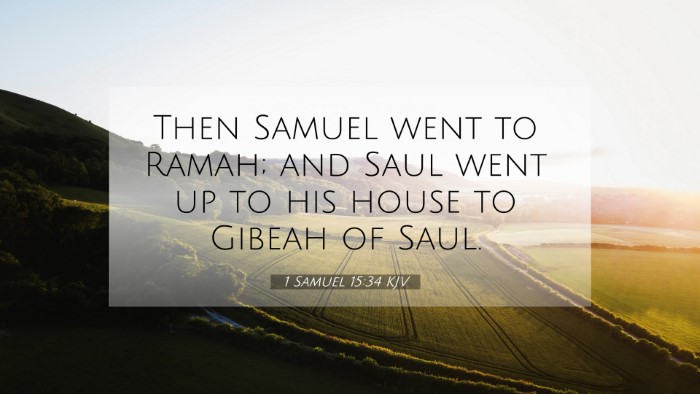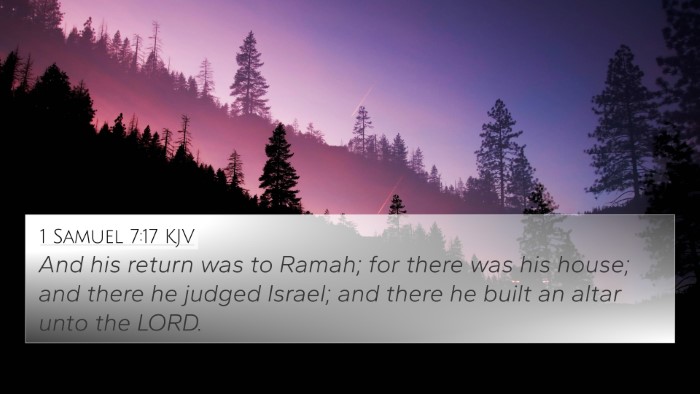Understanding 1 Samuel 15:34
Verse: 1 Samuel 15:34 - "Then Samuel went to Ramah; and Saul went up to his house to Gibeah of Saul."
Overview
This verse occurs at a critical juncture in the narrative of Saul's kingship. After Saul's disobedience to God's command regarding the Amalekites, he faces the consequences of rejecting divine instruction, exemplified in God's regret over having appointed him as king.
Verse Meaning and Analysis
- Matthew Henry's Commentary: Henry emphasizes the sorrow of both Samuel and Saul. Samuel's journey to Ramah signifies a return to a place of spiritual authority and reflection after confronting Saul. Samuel’s deep emotional response highlights the gravity of Saul’s failure and its implications for Israel’s future.
- Albert Barnes' Notes: Barnes notes that Saul's departure to Gibeah reflects the isolation he experiences after losing divine favor. The weight of his failure contrasts sharply with the initial promise of his kingship, illustrating the consequences of disobedience.
- Adam Clarke’s Commentary: Clarke discusses the implications of Samuel returning to Ramah. This return symbolizes a withdrawal from Saul, signifying that God’s presence and support have now left the unrepentant king. The act of turning back serves as a powerful metaphor for spiritual disconnection.
Theological Implications
The sum importance of this verse lies in its reflection on divine authority and judgment. It exposes the reality that God holds leaders accountable for their obedience and sets a precedent for future biblical narratives regarding kingship and divine oversight. The emotional turmoil of both Samuel and Saul illustrates the personal and communal ramifications of unfaithfulness to God.
Cross-References
This verse has several biblical cross-references that enrich its meaning:
- 1 Samuel 8:7: Demonstrates God's discontent with Israel's demand for a king.
- 1 Samuel 10:19: Saul’s initial election as king, showing the shift in God’s plan.
- 1 Samuel 13:14: God choosing a man after His own heart, a contrast to Saul.
- 1 Samuel 16:1: Samuel is instructed to anoint David, marking a new beginning.
- 1 Samuel 28:16: The evaluation of Saul’s fate in the spiritual realm.
- Psalm 51:11: Reflects on the request of God not to withdraw His spirit, showcasing the dire consequences of Saul’s disobedience.
- 1 Chronicles 10:13-14: An assessment of Saul’s downfall due to his unfaithfulness.
Connections Between Bible Verses
The thematic connections between this verse and others highlight the larger narrative of disobedience and consequences in scripture:
- Disobedience: 1 Samuel 15:1-3 serves as the command leading to Saul’s downfall.
- Leadership Accountability: Ezekiel 34:10 emphasizes the responsibilities of spiritual leaders.
- God’s Sovereignty: Romans 13:1-2 reflects on God’s institution of authority and its implications.
Practical Applications and Reflection
1 Samuel 15:34 teaches profound lessons applicable to contemporary Christian life:
- Seek God's guidance in leadership roles.
- Understand the gravity of obedience to divine commands.
- Reflect on the relationship dynamics between leaders and God.
Tools for Bible Cross-Referencing
To further explore the depths of this verse and its connections:
- Utilize a Bible Concordance to find related verses efficiently.
- Employ a Cross-Reference Bible Study method for deeper understanding.
- Study thematic links, such as the discussion on leadership in the Bible.
Conclusion
1 Samuel 15:34 serves as a poignant reminder of the consequences of disobedience within the context of God’s plan for His people. By examining this verse alongside related passages, believers can gain a comprehensive understanding of the biblical themes of obedience, leadership, and divine judgment.




